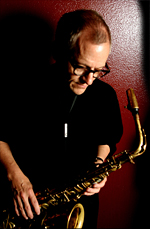Quintet is a jazz mission for local players
by ERIC CARPENTER
La Habra/Brea Star Progress - January 6, 2005
La Habran Bruce Babad and Brean Tom Ranier celebrate icons in The Cannonball-Coltrane Project
Bruce Babad believes it was a bit of divine intervention that led him to his current music project - a tribute to jazz saxophone legends John Coltrane and Julian "Cannonball" Adderley.
The La Habra saxophonist has idolized Adderley since he first laid hands on an alto saxophone in junior high.
Now he's playing Adderley's parts in The Cannonball-Coltrane Project, a quintet of Orange County Musicians who perform classics and original compositions that pay homage to the two great jazz greats.
The Project formed about a year ago and plays their most prestigious git to date Saturday and Sunday at the Orange County Performing Arts Center's Founders Hall.
The quintet also includes Brea pianist Tom Ranier, a studio performer who has played on soundtracks for "Sleepless in Seattle," "Pearl Harbor" and "A League of Their Own."
Ranier said the band is a welcome break, offering him musical freedom from the controlled environment of studio work.
"This is a project that allows us each to express our appreciation for what's come before, but also to express ourselves so that we're not just trying to be clones," Ranier said.
"In t hat way, the excitement of the music comes through, reaches out to people and, we hope, will appeal to more than just fans of Cannonball and Coltrane."
Early Rhythms
Babad's exposure to Cannonball Adderley comes early.
His hairstylist mother cut Adderley's hair when he toured through Babad's childhood hometown in the mountains outside of Denver. The Babads would get tickets to that night's gig in exchange for the haircut.
A young Bruce, tucked into a crib behind the bandstand, would soak in the beat, the thump of the bass and the unmatched soulfulness of Cannonball's saxophone wailing.
"I was truly lucky that my parents were real jazz lovers, so it was all around me growing up," said Babad (pronounced ba-BAD), 44.
He joined his school's stage band in ninth grade. He had no fear as a musician and always volunteered to play the solos. By 10th grade, he knew.
"I remember sitting on my bed and saying, "That's what I'm going to do with my life, I'm going to be a musician."
In college, he found himself turning toward "high energy, high testosterone" jazz.
But he gravitated back to the mellow, mournful sounds of Adderley when he rediscovered the classic 1959 Miles Davis album "Kind of Blue," which featured Adderley and Coltrane as soloists.
"There's such a soulful element to his playing," Babad said. "There's a sound in between two notes that gives it tension and pain. He grabbed that at the exact right time.
"Cannonball didn't play so much as he spoke from his gut, through his instrument," he said.
Babad, now a nusic instructor at Fullerton College, moved to La Habra six years ago. He's such a fan of Adderley's that his second son, 8, is named Julian in his honor. His eldest son, 9, is named Miles.
Bassist and group leader Luther Hughes had played with Babad before and thought of his sound when looking for a saxophonist to play Adderley's parts. He didn't know Babad was such a fan.
"I really feel like it was the grace of God that brought me to this project," Babad said, "When he first said, `I want you to be my alto guy,' all I could think is `Wow, those are some big shoes to try to fill.'"
A Studious Approach
Tom Ranier was asked to join the project because of his reputation as a stellar studio and live pianist.
But his love of Coltrane and Adderley also dates back to childhood. Before he sat down at the keys, he learned to play saxophone.
"They were both huge influences on me and that was an attraction to this project," said Ranier.
"There's a satisfaction to going into the studio and nailing a part as you're asked," he added. "But in this project, you can contribute. It's about freedom."
He said he's not looking to emulate what the pair did before they died - Coltrane of liver disease in 1967, Adderley of a stroke in 1975.
Ranier wants to honor them by bringing his own influence to create a new, vibrant sound.
"When you consider what's already been done by these guys, it gets very intimidating," he added.
"But at some point, you've got to let that go and make it your own."

